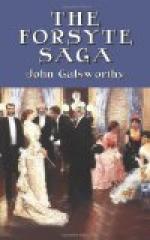The month being March the trees were exceptionally like the masts of ships, and for little Jon that was a wonderful Spring, extremely hard on his knees, suits, and the patience of “Da,” who had the washing and reparation of his clothes. Every morning the moment his breakfast was over, he could be viewed by his mother and father, whose windows looked out that way, coming from the study, crossing the terrace, climbing the old oak tree, his face resolute and his hair bright. He began the day thus because there was not time to go far afield before his lessons. The old tree’s variety never staled; it had mainmast, foremast, top-gallant mast, and he could always come down by the halyards—or ropes of the swing. After his lessons, completed by eleven, he would go to the kitchen for a thin piece of cheese, a biscuit and two French plums—provision enough for a jolly-boat at least—and eat it in some imaginative way; then, armed to the teeth with gun, pistols, and sword, he would begin the serious climbing of the morning, encountering by the way innumerable slavers, Indians, pirates, leopards, and bears. He was seldom seen at that hour of the day without a cutlass in his teeth (like Dick Needham) amid the rapid explosion of copper caps. And many were the gardeners he brought down with yellow peas shot out of his little gun. He lived a life of the most violent action.
“Jon,” said his father to his mother, under the oak tree, “is terrible. I’m afraid he’s going to turn out a sailor, or something hopeless. Do you see any sign of his appreciating beauty?”




